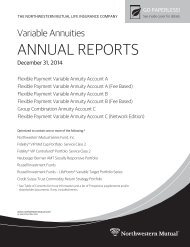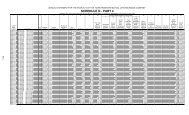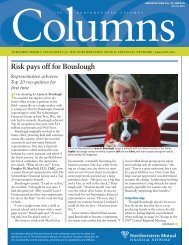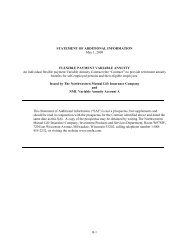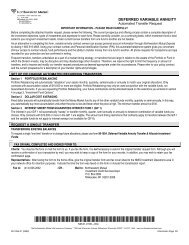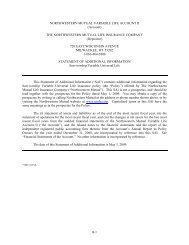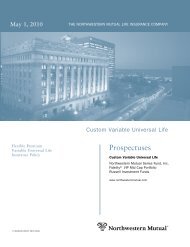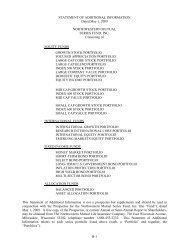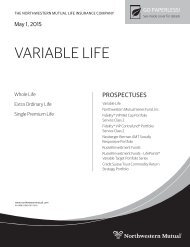shareholders and the effect on shareholder rights. We generally support shareholder proposals that call forthe separation of the Chairman and CEO positions unless there are sufficient governance safeguardsalready in place. With respect to proposals for the approval of a company’s auditor, we oppose auditorswho have a significant non-audit relationship with the company.Executive Compensation Issues – T. Rowe Price’s goal is to assure that a company’s equity-basedcompensation plan is aligned with shareholders’ long-term interests. While we evaluate plans on a caseby-casebasis, T. Rowe Price generally opposes compensation packages that provide what we view asexcessive awards to a few senior executives or that contain excessively dilutive stock option grants basedon a number of criteria such as the costs associated with the plan, plan features, burn rates which areexcessive in relation to the company’s peers, dilution to shareholders and comparability to plans in thecompany’s peer group. We generally oppose efforts to reprice options in the event of a decline in valueof the underlying stock unless such plans appropriately balance shareholder and employee interests, andthe retention of key personnel has become a genuine risk to the company’s business. For companies withparticularly egregious pay practices such as excessive severance packages, perks, and bonuses (despiteunder-performance), or moving performance targets (to avoid poor payouts), we may vote againstcompensation committee members. Finally, we vote for proposals (either management or shareholdersponsored)calling for shareholder ratification of a company’s executive compensation practices (“Sayon-Pay”proposals) a majority of the time.Mergers and Acquisitions – T. Rowe Price considers takeover offers, mergers, and otherextraordinary corporate transactions on a case-by-case basis to determine if they are beneficial toshareholders’ current and future earnings stream and to ensure that our Price Funds and clients arereceiving fair compensation in exchange for their investment.Social and Corporate Responsibility Issues – Vote recommendations for corporate responsibilityissues are generated by the Global Corporate Governance Analyst using RMG’s proxy research. T. RowePrice generally votes with a company’s management on social, environmental and corporateresponsibility issues unless the issue has substantial investment implications for the company’s businessor operations which have not been adequately addressed by management. T. Rowe Price supports welltargetedshareholder proposals on environmental and other public policy issues that are particularlyrelevant to a company’s businesses.Global Portfolio Companies – RMG applies a two-tier approach to determining and applyingglobal proxy voting policies. The first tier establishes baseline policy guidelines for the mostfundamental issues, which span the corporate governance spectrum without regard to a company’sdomicile. The second tier takes into account various idiosyncrasies of different countries, makingallowances for standard market practices, as long as they do not violate the fundamental goals of goodcorporate governance. The goal is to enhance shareholder value through effective use of the shareholderfranchise, recognizing that application of policies developed for U.S. corporate governance issues are notnecessarily appropriate for all markets. The Proxy Committee has reviewed RMG’s general globalpolicies and has developed international proxy voting guidelines which in most instances are consistentwith RMG recommendations.Votes Against Company Management – Where RMG recommends a vote against management onany particular proxy issue, the Proxy Administrator ensures that the portfolio manager reviews suchrecommendations before a vote is cast. Consequently, if a portfolio manager believes that management’sview on a particular proxy proposal may adversely affect the investment merits of owning stock in aparticular company, he/she votes contrary to management. Also, our research analysts present their votingrecommendations in such situations to our portfolio managers.Index and Passively Managed Accounts – Proxy voting for index and other passively-managedportfolios is administered by the Proxy Services Group using T. Rowe Price’s policies as set by the ProxyCommittee. If a portfolio company is held in both an actively managed account and an index account, theindex account will default to the vote as determined by the actively managed proxy voting process.B-128
Divided Votes – In situations where a decision is made which is contrary to the policiesestablished by the Proxy Committee, or differs from the vote for any other client or T. Rowe Price Fund,the Proxy Services Group advises the portfolio managers involved of the divided vote. The personsrepresenting opposing views may wish to confer to discuss their positions. In such instances, it is thenormal practice for the portfolio manager to document the reasons for the vote if it is against T. RowePrice policy. The Proxy Administrator is responsible for assuring that adequate documentation ismaintained to reflect the basis for any vote which is cast in opposition to T. Rowe Price policy.Shareblocking – Shareblocking is the practice in certain foreign countries of “freezing” shares fortrading purposes in order to vote proxies relating to those shares. In markets where shareblocking applies,the custodian or sub-custodian automatically freezes shares prior to a shareholder meeting once a proxyhas been voted. Shareblocking typically takes place between one and fifteen (15) days before theshareholder meeting, depending on the market. In markets where shareblocking applies, there is apotential for a pending trade to fail if trade settlement takes place during the blocking period. T. RowePrice’s policy is generally to abstain from voting shares in shareblocking countries unless the matter hascompelling economic consequences that outweigh the loss of liquidity in the blocked shares.Securities on Loan – The T. Rowe Price Funds and our institutional clients may participate insecurities lending programs to generate income. Generally, the voting rights pass with the securities onloan; however, lending agreements give the lender the right to terminate the loan and pull back the loanedshares provided sufficient notice is given to the custodian bank in advance of the voting deadline. T.Rowe Price’s policy is generally not to vote securities on loan unless the portfolio manager hasknowledge of a material voting event that could affect the value of the loaned securities. In this event, theportfolio manager has the discretion to instruct the Proxy Administrator to pull back the loaned securitiesin order to cast a vote at an upcoming shareholder meeting.Vote Execution and Monitoring of Voting ProcessOnce the vote has been determined, the Proxy Administrator enters votes electronically intoRMG’s Governance Analytics system. RMG then transmits the votes to the proxy agents or custodianbanks and sends electronic confirmation to T. Rowe Price indicating that the votes were successfullytransmitted.On a daily basis, the Proxy Administrator queries the Governance Analytics system to determinenewly announced meetings and meetings not yet voted. When the date of the stockholders’ meeting isapproaching, the Proxy Administrator contacts the applicable portfolio manager if the vote for a particularclient or Price Fund has not yet been recorded in the computer system.Should a portfolio manager wish to change a vote already submitted, the portfolio manager maydo so up until the deadline for vote submission, which varies depending on the company’s domicile.Monitoring and Resolving Conflicts of InterestThe Proxy Committee is also responsible for monitoring and resolving possible material conflictsbetween the interests of T. Rowe Price and those of its clients with respect to proxy voting. We haveadopted safeguards to ensure that our proxy voting is not influenced by interests other than those of ourfund shareholders. While membership on the Proxy Committee is diverse, it does not include individualswhose primary duties relate to client relationship management, marketing, or sales. Since T. RowePrice’s voting guidelines are pre-determined by the Proxy Committee using recommendations fromRMG, an independent third party, application of the T. Rowe Price guidelines by fund portfolio managersto vote fund proxies should in most instances adequately address any possible conflicts of interest.However, the Proxy Committee reviews all proxy votes that are inconsistent with T. Rowe Priceguidelines to determine whether the portfolio manager’s voting rationale appears reasonable. The ProxyCommittee also assesses whether any business or other relationships between T. Rowe Price and aB-129
- Page 4:
APPENDIX F - Proxy Voting Policies
- Page 9 and 10:
stocks that make up that index. Str
- Page 11 and 12:
Interest rate swaps do not involve
- Page 13 and 14:
the Adviser or Sub-Adviser will not
- Page 17 and 18:
Forward Contracts. The Portfolios m
- Page 19 and 20:
principal amount as the call writte
- Page 21 and 22:
Options on Foreign Currencies. The
- Page 23 and 24:
securities. The issuers of the unde
- Page 25 and 26:
the former pools. However, timely p
- Page 27 and 28:
CMO residuals are generally purchas
- Page 29:
utilize the underlying assets may r
- Page 32 and 33:
include range floaters which are a
- Page 34 and 35:
par unless the price of the underly
- Page 36 and 37:
to changes in interest rates genera
- Page 38 and 39:
corresponding floaters. The underly
- Page 40 and 41:
A Portfolio will not enter into suc
- Page 42 and 43:
egulations. The presence of an issu
- Page 44 and 45:
Portfolio TurnoverPortfolio turnove
- Page 46 and 47:
The ability of the Portfolio to ach
- Page 48 and 49:
Advisors, LLC, in accordance with t
- Page 50 and 51:
OWNERSHIP OF SHARES OF THE FUNDAll
- Page 52 and 53:
on the next $50 million, 0.50% on t
- Page 54 and 55:
Independent Registered Public Accou
- Page 56 and 57:
Name of Portfolio 2008 2007 2006Int
- Page 58 and 59:
Broker High Yield Bond BalancedAsse
- Page 60 and 61:
and cost of trade execution of Port
- Page 62 and 63:
Effective April 30, 2008, the Fund
- Page 64 and 65:
TAXES AND DIVIDENDSEach Portfolio i
- Page 66 and 67:
APPENDIX A - Credit RatingsDescript
- Page 68 and 69:
F2Good credit quality. A satisfacto
- Page 70 and 71:
. Moody’s Commercial Paper (short
- Page 72 and 73:
Plus (+) or minus (-)The ratings fr
- Page 74 and 75:
APPENDIX B - Directors and Officers
- Page 76 and 77:
Name, Address, andYear of BirthDavi
- Page 78 and 79: APPENDIX C - Ownership of Shares of
- Page 80 and 81: SMALL CAP VALUE PORTFOLIOGeneral Ac
- Page 82 and 83: APPENDIX D - Portfolio ManagersOthe
- Page 84 and 85: PortfolioManager(s)FundRegisteredIn
- Page 86 and 87: Compensation of Portfolio ManagersM
- Page 88 and 89: management firms. Performance is pr
- Page 90 and 91: Portfolio managers are eligible for
- Page 92 and 93: PortfolioPortfolio Manager(s)Dollar
- Page 94 and 95: On August 25, 2005, the Court enter
- Page 96 and 97: MSA’s Equity Trading Department s
- Page 98 and 99: ERISA ClientsIn the case of client
- Page 100 and 101: Shareholder Ability to Call Special
- Page 102 and 103: • Exercise price• Participation
- Page 104 and 105: Amend Quorum RequirementsVote propo
- Page 106 and 107: Vote proposals to increase blank ch
- Page 108 and 109: employees of Investment Manager and
- Page 110 and 111: will not support the position of a
- Page 112 and 113: company specifies the voting, divid
- Page 114 and 115: egarding whether Investment Manager
- Page 116 and 117: 3. The issuer is an entity particip
- Page 118 and 119: manager(s) are responsible for maki
- Page 120 and 121: Global Corporate Governance: Invest
- Page 122 and 123: 13. The Proxy Group will review the
- Page 124 and 125: determined by those investment comm
- Page 126 and 127: T. Rowe Price has adopted these Pro
- Page 130 and 131: portfolio company could have influe
- Page 132 and 133: The Proxy Voting Service will refer
- Page 134 and 135: that substantially differs from dom
- Page 136 and 137: 15. Janus will generally vote in fa
- Page 138 and 139: 46. For shareholder proposals outsi
- Page 140 and 141: 2. Staggered BoardIf a company has
- Page 142 and 143: proposed for a legitimate business
- Page 144 and 145: APPENDIX G - Portfolio Holdings Dis
- Page 146: ICP Securities LLCIntermonte Securi



